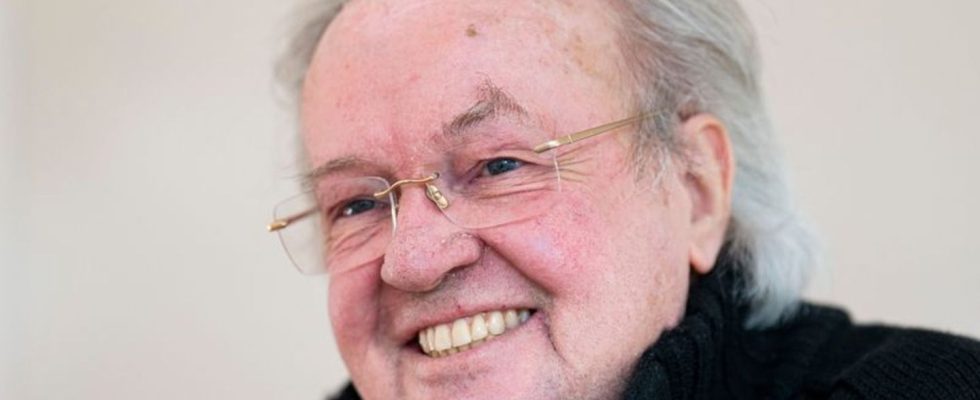The series “Somehow and Anyway” has cult status. Director Franz Xaver Bogner delves into 1968. Now the filmmaker is turning 75 – and has good news for his fans.
If you want to know what makes people in Bavaria really tick, we recommend the series and films by Franz Xaver Bogner. Like no other, the filmmaker tells of a life beyond Alpine kitsch and nationalism.
The people in his cult series “Somehow and Anyway”, but also in “Munich 7” or, more recently, in “Heaven, Lord, Sacrament” are down-to-earth, idiosyncratic and with rough edges that make them interesting, approachable and real. The fact that this is the case has a lot to do with the personality of its creator, who turns 75 today.
Others his age are enjoying retirement. Not so Bogner. He welcomes you to his office in Neubiberg near Munich in a good mood. Behind his desk there are boards with all sorts of colorful lines and arrows. A scene from the third episode of “Heaven, Lord, Sacrament” was sketched here for the camera angles, explains Bogner. He seems very at peace with himself – and satisfied.
The desire to work
That’s a stroke of luck, he says about his work as a director and screenwriter. “If I now sum up, I can say that I have fulfilled the job and will continue to fulfill it. I have not regretted it for a second.”
Writing, preparing for a shoot and working on set – “that still gives me great pleasure and joy. I never had the thought, ‘Now I’m going to open a kiosk'”.
Down-to-earthness is in Bogner’s blood. He grew up in Markt Schwaben, an unspectacular community in the east of Munich. He attended high school in Erding. After an apprenticeship at a copying factory in Munich, he went to the then still young University of Television and Film (HFF).
The series “Somehow and Anyway” with Ottfried Fischer, Elmar Wepper and Robert Giggenbach made him a cult director in 1986. The friends Sir Quickly, Sepp and Effendi experience the exciting times around 1968 and dream of love, freedom and rebellion. And all in genuine Bavarian.
The freedom of the 1960s
The wild 1960s – the best decade for Bogner. “On the one hand we were young, on the other hand it was the right music. Everything had the touch of new beginnings. And there were the most beautiful cars. In the 1970s everything became more civil,” explains the filmmaker. “We would be arrested straight away if you did today what we did back then,” for example, throwing stones at the Markt Schwaben police station out of boredom. “Then we ran away and they came after us,” he remembers with a laugh.
Otherwise, he doesn’t like romanticizing old times. “The contemplative look into the past primarily serves to revive situations that I know from before and that I incorporate into stories. But this feeling of longing with sentences like “everything used to be better” and “the good old ones Time,” that’s not my thing.”
Down-to-earth view of humanity
What is definitely his thing is the precise, humorous and loving look at normal people and their sensitivities. In “Café Meineid”, for example, he brought the bizarre cases of district judge Wunder to an enthusiastic television audience for almost 30 years starting in 1990.
“Munich 7” is about a police station on Viktualienmarkt, where Andreas Giebel and Florian Karlheim go about their work unconventionally as police officers Bartl and Kandler. Works such as the drama “Madame Bäuerin”, the series “The Emperor of Schexing” and the film “The Eternal Song” about the creation of the world-famous Christmas classic “Silent Night” were also successful. The reward: many awards such as the Grimme Prize and the Bavarian Television Prize.
Plans for old and new
He is currently working on a kind of “Somehow and Anyway 2.0,” reveals Bogner. It’s about people with moral courage who don’t put up with anything and do their part in everyday anarchy. He would also like to continue the series “Heaven, Lord, Sacrament” with Stephan Zinner and Anne Schäfer.
Based on the non-fiction book by the Munich pastor Rainer Maria Schiessler, it tells of a rather unconventional clergyman who repeatedly causes unrest among his superiors. “I think that the story of this pastor has not yet been told in relation to the general situation of the church,” says Bogner.
But now first the birthday. Bogner wants to celebrate with his family, which, in addition to his wife and four children, now also includes three grandchildren, for whom he enjoys making time. “I’m taking advantage of the joys of a grandfather who doesn’t have to educate much and can enjoy a lot.” The big celebration is to follow: “I think it’s nicer outside. When spring comes, I’ll have a celebration as a spring festival.”

